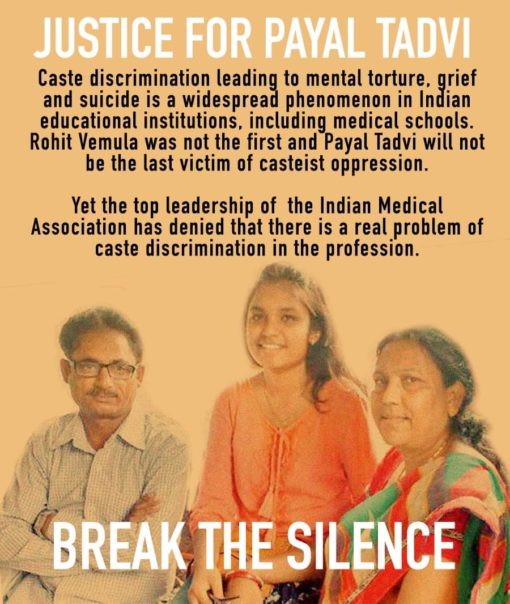This is not a suicide. This is an “institutional murder”. Remember her name. And remember the names of those responsible for her death. Remember this, those of you who can’t distinguish privilege from merit, or when you complain about reservations. Remember this when you hear “Caste is not a problem in urban India”.
On May 22, 23-year-old Dr Payal Tadvi, a postgraduate student of gynaecology at the National Topiwala Medical College, took her own life. Who and what drove her to such an extreme measure?
Payal was from the Tadvi Muslim Scheduled Tribe community. This was cause enough for three doctors she worked with, Bhakti Mehre, Hema Ahuja and Ankita Khandelwal, to torment her. They abused her with casteist slurs. They humiliated her for having got admission via the reservation quota system. They denied her access to crucial training that she, a second year student, should have been undergoing. They bullied her relentlessly.
The medical college is attached to the BYL Nair Hospital. Payal’s complaints to the relevant authorities went more or less unheeded. In other words, their silence was tantamount to complicity in harassing a young Adivasi woman – who would have been the first doctor from her community.
This is not a suicide. This is an “institutional murder”. Remember her name. And remember the names of those responsible for her death. Remember this, those of you who can’t distinguish privilege from merit, or when you complain about reservations. Remember this when you hear “Caste is not a problem in urban India”.
The three doctors have been arrested today. But contrary to evidence, the Indian Medical Association continues to deny caste discrimination in the medical profession.
In a statement, the Jan Swasthya Abhiyan said:
“Adivasis, Dalits, Muslims, and other marginalised communities continue to be poorly represented in the medical community, like in all other professional communities due to sustained discrimination. Those who manage to overcome the hurdles of institutional discrimination, are forced to experience harassment and abuse by powerful casteist medical fraternity and leadership in institutions, which fail to acknowledge, and act to uphold accountability. This, despite Constitutional mandates and Human Rights Standards reaffirming the right to affirmative action to ensure equity and justice.
We strongly condemn all forms of caste-ism, discrimination and violation of human rights within diverse institutions. We demand that speedy justice should be delivered to Dr. Payal and the bereaved family. The accused should be arrested and the law must take its course. The institutional authorities should be held accountable and strict action taken against them.”
Payal is the latest victim of deep-seated institutional discrimination. Remember Rohith Vemula from the University of Hyderabad, Senthil Kumar from Hyderabad Central University, Delta Meghwal from the Jain Adarsh Teacher Training Institute. There are many more :
They Chose Death over Humiliation
Panel to Probe Rohith Vemula’s Death: A Cynical Denial of Caste Discrimination
Anitha is Killed by Modi’s Homogenising Obsession
The Thorat Committee Report investigated caste discrimination in AIIMS, New Delhi. It was a milestone in attempting to combat institutionalised discrimination. But committes and reports are only the first step. The road ahead has to take us to changes in policy, as well as laws that hold institutions responsible, not just individual perpetrators.

 Image Courtesy: Orijit Sen
Image Courtesy: Orijit Sen


